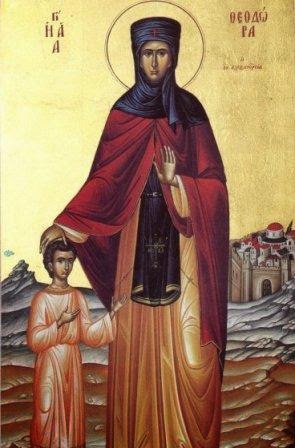Overall I liked this unit. I thought that some of the stories were very interesting. My favorite stories were of Theodora, Christine, and Mary of Egypt.
I loved Theodora's because it went into more detail than many of the stories. It talked about her life before she became holy and about her feelings. It also went into more detail about her life while living in the monastery and what led to her being accused of adultery as a monk. Also it talked a lot about her life on the streets with the boy and how she fought demons who kept trying to trick her. I think I could connect more with Theodora than any of the other women saints in the stories.
I liked Christine's story because of the amount of detail in the story also. However, the detail in Christine's story was much different than Theodora's. While many stories just say that the saints were tortured, Christine's story talks about the fate of the men who tortured her and the hardships they put her through to try to convert her back to pagan religion.
Finally, I liked Mary's story, mostly because it was so different from any of the other stories in this Unit. Many of the stories had similar messages and basic plots for the stories. For example in many, a woman runs away dressed as a man to become a monk, or a woman refuses to marry a pagan, or a woman is kept in a tower by her pagan father to keep her pure for making offerings. Mary's story was not like any of them. Her story was unique in that she was alone for most of her life, and she preferred it that way. Also, the fact that she lived naked in the desert for years was quite unique.
While I did like the unit, I also wish there hadn't been quite so many similar stories. A couple of them I felt like I was just rereading with some details and names altered. I think that's why Christine's and Theodora's stood out, also. While they were two stories that fit into one of the reused plots, their stories still felt more unique than others because there was more focus on the women and in Theodora's case, her emotions, not just what happened to her.
I would chose this unit again, knowing what I know now about it. I do think it would have been helpful to include a few more definitions, as the language is a bit hard to understand at first. The words that were linked to Wikipedia articles and definitions were very helpful. And after I looked up some words it got easier as I adjusted to the older writing style.
 |
| My favorite picture from the unit was in Saint Martha's story. By Andre Abellon, "Saint Martha and the Dragon" |


.png)

